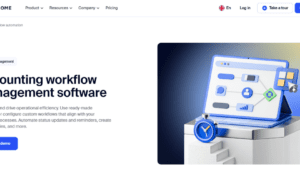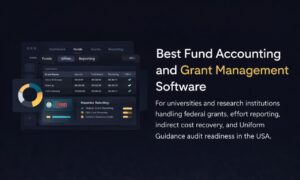Are you passionate about numbers, meticulous with details, and driven by the pursuit of financial accuracy? Well then, my ambitious friend, it’s time to embark on an exciting journey towards becoming a financial auditor! In our comprehensive guide for aspiring professionals like yourself, we’ll uncover the fascinating realm of auditing while paving your way to success. Whether you’re starting from scratch or seeking to level up your career in finance, this blog post is packed with invaluable insights and practical tips that will equip you with everything you need to know. So grab a pen and get ready to dive into the world of financial audits – where precision meets opportunity.
What Is A Financial Auditor?
A financial auditor is an individual who independently assesses an organization’s financial statements and accompanying disclosures to ensure they are free from material misstatement and accurately reflect the organization’s financial position. Financial auditors also provide assurance on whether an organization’s internal controls are adequate to safeguard against material misstatement and fraud.
The role of financial auditor has become increasingly important in recent years as organizations have become more complex and global in nature. Financial scandals at large organizations have underscored the need for independent, objective assurance on an organization’s financial statements.
Aspiring financial auditors typically possess a bachelor’s degree in accounting or a related field. Many audit firms also require candidates to have completed a professional accounting designation such as the Chartered Professional Accountant (CPA) designation in Canada or the Certified Public Accountant (CPA) designation in the United States. Financial auditors must have strong analytical and problem-solving skills, as well as be able to effectively communicate their findings.
Qualifications and Certifications Needed To Become a Financial Auditor
In order to become a financial auditor, you will need to have a minimum of a bachelor’s degree in accounting or a related field. Many financial auditors also have their Certified Public Accountant (CPA) designation. In addition to educational requirements, most employers will also require financial auditors to have at least two years of experience working in an accounting or auditing position.
How To Get Jobs As a Financial Auditor
In order to get a job as a financial auditor, there are a few things that you will need to do. First and foremost, you will need to obtain the proper education and credentials. Many financial auditors have at least a bachelor’s degree in accounting or a related field, although some employers may prefer candidates with master’s degrees or higher. In addition to educational requirements, most financial auditors also must be certified by passing an examination administered by the American Institute of Certified Public Accountants (AICPA).
Once you have met the basic educational and credentialing requirements, your next step is to identify potential employers. Large accounting firms are generally the largest employers of financial auditors, but there are also many opportunities with smaller firms, government agencies, and other organizations. The best way to find out about job openings is to network with individuals already working in the field, attend job fairs, or search online job databases.
When applying for jobs as a financial auditor, it is important to emphasize your strong analytical skills and ability to pay close attention to detail. Your resume should highlight your educational background and any relevant work experience, including internships or volunteer positions. In addition to submitting a resume, most employers will also require prospective employees to complete an application form and take part in an interview process. Successfully completing these steps will increase your chances of landing a job as a financial auditor.
Essential Skills Needed for Becoming a Financial Auditor
To become a financial auditor, you will need to develop a number of essential skills. These include:
Analytical skills: Financial auditors must be able to analyze complex financial data and identify problems or potential areas of concern. They need to be able to Think critically and logically in order to reach sound conclusions.
Attention to detail: Financial auditors must have a keen eye for detail in order to spot errors or irregularities in financial records. They need to be able to methodically check through large amounts of data in order to find any discrepancies.
Communication skills: Financial auditors need strong communication skills in order to effectively report their findings to clients or superiors. They also need to be able to explain complex financial concepts in plain language so that non-specialists can understand them.
Organizational skills: Financial auditors must be well organized in order to keep track of all the different elements of an audit. They need to be able to plan and carry out their work methodically in order to ensure that nothing is overlooked.
IT skills: Financial auditors must be proficient with using various types of accounting software as well as spreadsheets and databases. They will often need to create detailed reports using these tools, so it is important that they are comfortable using them.
Important Software Used by Financial Auditors
There are many software programs that financial auditors use to perform their job duties. Some of the most important software programs used by financial auditors include:
1. Accounting software: This type of software helps financial auditors keep track of an organization’s finances and transactions.
2. Audit tools: These software programs help financial auditors perform their audits more effectively and efficiently.
3. Data analysis tools: Financial auditors use these types of software programs to analyze data and identify trends.
4. Reporting tools: These software programs help financial auditors generate reports that summarize their findings.
Tips on Surviving Your First Year as Financial Auditor
Starting your career as a financial auditor can be both exciting and overwhelming. Here are a few tips to help you survive your first year on the job:
1. Be prepared for long hours. As a financial auditor, you can expect to work long hours, especially during busy season. Be sure to Pace yourself and take breaks when you can.
2. Stay organized and keep on top of your deadlines. A key part of being a successful auditor is staying organized and keeping track of deadlines. Make sure to use a planner or some type of system to keep yourself on track.
3. Don’t be afraid to ask for help. If you’re feeling overwhelmed or if you need help with something, don’t be afraid to ask for help from your seniors or managers.
4. Keep learning and sharpening your skills. The field of auditing is always changing, so it’s important to keep up with the latest changes and developments. Attend trainings and seminars, read industry publications, and talk to experienced professionals to make sure you’re always learning new things.
5. Build relationships with clients and colleagues. As an auditor, you’ll be working with clients and colleagues on a regular basis. It’s important to build positive relationships with them so that they feel comfortable coming to you with questions or concerns.
By following these tips, you can set yourself up for success in your first year as a financial auditor. Good luck!
The Impact of Regulations On Auditing Professionals
Auditing professionals are required to comply with numerous regulations, standards, and ethical requirements. The most notable regulatory authority for auditors is the Public Company Accounting Oversight Board (PCAOB). In order to protect investors and the public interest, the PCAOB regulates the audits of public companies and other issuers of securities.
The Sarbanes-Oxley Act (SOX) of 2002 also has a significant impact on the audit profession. SOX established new or enhanced standards for all U.S. public company boards, management, and public accounting firms. Key provisions of SOX include corporate responsibility for financial statements, establishment of new internal control over financial reporting requirements, and auditor independence.
Both the PCAOB and SOX have had a profound effect on the way auditing professionals conduct their work. In general, these regulations have made the audit process more rigorous and complex. As a result, auditors must have a thorough understanding of both the regulations themselves and how they impact the audit process.
Conclusion
Becoming a financial auditor is an achievable and rewarding career path for those who have the passion and dedication to become certified. With this comprehensive guide, we hope to have provided aspiring professionals with the necessary guidance as they embark on their journey towards becoming a financial auditor. From understanding what qualifications are required, getting practical experience or gaining certifications, follow each step of this guide closely in order to move closer towards achieving success in your chosen field.



































